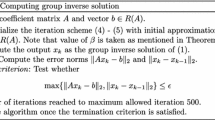Abstract
Some of the authors show in Iwasaki and Nakamura (Inverse Probl 20:553–563, 2004) that the integrable discrete Lotka–Volterra (dLV) system is applicable for computing singular values of bidiagonal matrix. The resulting numerical algorithm is referred to as the dLV algorithm. They also observe in Iwasaki and Nakamura (Electron Trans Numer Anal 38:184–201, 2011) that the singular values are numerically computed with high relative accuracy by using the mdLVs algorithm, which is an acceleration version by introducing a shift of origin. In this paper, we investigate the perturbations on singular values and the forward errors of the mdLVs variables, which occur in the mdLVs algorithm, through two kinds of error analysis in floating point arithmetic. Therefore the forward stability of the mdLVs algorithm in the sense of Bueno–Marcellan–Dopico is proved.
Similar content being viewed by others
References
Bueno, M.I., Marcellan, F.: Darboux transformation and perturbation of linear functionals. Linear Algebra Appl. 384, 215–242 (2004)
Bueno, M.I., Dopico, F.M.: A more accurate algorithm for computing the Christoffel transformation. J. Comput. Appl. Math. 205, 567–582 (2007)
Chaitin-Chatelin, F., Fraysse, V.: Lectures on Finite Precision Computations. SIAM, Philadelphia (1996)
Demmel, J., Kahan, W.: Accurate singular values of bidiagonal matrices. SIAM J. Sci. Statist. Comput. 11, 873–912 (1990)
Fernando, K.V., Parlett, B.N.: Accurate singular values and differential qd algorithms. Numer. Math. 67, 191–229 (1994)
Higham, N.J.: Accuracy and Stability of Numerical Algorithms, 2nd edn. SIAM, Philadelphia (2002)
Hirota, R.: Conserved quantities of a random-time Toda equation. J. Phys. Soc. Jpn. 66, 283–284 (1997)
Iwasaki, M., Nakamura, Y.: On the convergence of a solution of the discrete Lotka–Volterra system. Inverse Probl. 18, 1569–1578 (2002)
Iwasaki, M., Nakamura, Y.: An application of the discrete Lotka–Volterra system with variable step-size to singular value computation. Inverse Probl. 20, 553–563 (2004)
Iwasaki, M., Nakamura, Y.: Accurate computation of singular values in terms of shifted integrable schemes. Jpn. J. Ind. Appl. Math. 23, 239–259 (2006)
Iwasaki, M., Nakamura, Y.: Positivity of dLV and mdLVs algorithms for computing singular values. Elec. Trans. Numer. Anal. 38, 184–201 (2011)
Parlett, B.N.: The new qd algorithm. Acta Numer. 4, 459–491 (1995)
Rutishauser, H.: Lectures on Numerical Mathematics. Brinkhäuser, Boston (1990)
Spiridonov, V., Zhedanov, A.: Discrete-time Volterra chain and classical orthogonal polynomials. J. Phys. A.: Math. Gen. 30, 8727–37 (1997)
Author information
Authors and Affiliations
Corresponding author
Rights and permissions
About this article
Cite this article
Nagata, M., Iwasaki, M. & Nakamura, Y. Error analysis of the mdLVs algorithm for computing bidiagonal singular values. Numer Algor 61, 261–274 (2012). https://doi.org/10.1007/s11075-012-9607-5
Received:
Accepted:
Published:
Issue Date:
DOI: https://doi.org/10.1007/s11075-012-9607-5




